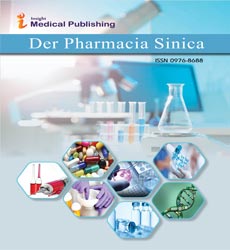ISSN : 0976 - 8688
Der Pharmacia Sinica
Breast Cancer and Indole -3-Carbinol: Controversy of Estrogen Level and Enzyme Elastase
Abstract
Estrogen-responsive breast cancer cells, such as MCF7 and T47D cells, express both estrogen receptor ER and ERß. Indole-3-carbinol (I3C) strongly down-regulated ER protein and transcript levels, without altering the level of ERß protein, in both cell lines. In cells transfected with the ER promoter linked to a luciferase gene reporter, I3C ablated ER promoter activity1-5. Dietary indole-3-carbinol has prevented the development of estrogen-enhanced cancers including breast. Whereas estrogen increases the growth and survival of tumors, indole-3-carbinol causes growth arrest and increased apoptosis and ameliorates the effects of estrogen. In these findings best use indole-3-carbinol together with other nutrients (genistein) to achieve maximum benefits for cancer prevention. Investigator evaluated whether genistein, which has the major isoflavonoid in soy, would alter the ability of indole-3-carbinol/DIM to cause apoptosis and decrease expression driven by the estrogen receptor (ER)-alpha. Synergistic effect of indole-3-carbinol and genistein for induction of GADD expression, thus increasing apoptosis, and for decrease of expression driven by ER-alpha. Because of the synergistic effect of indole-3-carbinol and genistein, the potential exists for prophylactic or therapeutic efficacy of lower concentrations of each phytochemical when used in combination.I3C inhibits the enzyme elastase. High levels of elastase in breast cancer cells are suggestive of a poor prognosis because elastase shortens cyclin E, a cellular chemical involved in controlling the cell cycle, and the shortened version of cyclin E speeds up the cell cycle, therefore
Open Access Journals
- Aquaculture & Veterinary Science
- Chemistry & Chemical Sciences
- Clinical Sciences
- Engineering
- General Science
- Genetics & Molecular Biology
- Health Care & Nursing
- Immunology & Microbiology
- Materials Science
- Mathematics & Physics
- Medical Sciences
- Neurology & Psychiatry
- Oncology & Cancer Science
- Pharmaceutical Sciences
